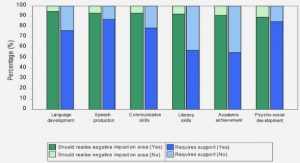Get Complete Project Material File(s) Now! »
Batswana and Developing Countries’ Entrepreneurship Skills
Ronan et al. (1997) seems to be the only study to have addressed the issue on whether or not Batswana business persons possess entrepreneurial skills. This study concluded that Batswana entrepreneurs rank lowly in entrepreneurship skills (Ronan et al, 1997:43). The Delphi technique was used to collect the data and a high degree of consensus was reached among the selected experts in their ranking of Batswana entrepreneurs. The experts were given a list of traits, attitudes and business skills on which they had to rank the entrepreneurs on a Likert scale of 1 to 5, with 5 indicating the highest level of skills. The entrepreneurs were ranked highest with respect to optimism; and ranked lowest with respect to innovativeness and creativity, foresightfullness and competitiveness.
The strength of this study is that it sought views of bankers and consultants, experts who deal with Batswana entrepreneurs on a daily basis. The weakness of the study lay in the fact that the views of the experts were merely on notional „Batswana entrepreneurs‟ and not any specific selected group of individuals. Secondly the conclusions were drawn from a sample of only 28 experts whose representativeness was questionable as we were not given the total population of such experts in Botswana.
Ronan et al. (1997) assume background knowledge of traits, attitudes and business skills. This knowledge is, however, not that common. Hannu Littunen (2000) explains some of the characteristics of the entrepreneurial personality. (S)he highlights the two schools of thought in existence in entrepreneurship: the trait model and contingency thinking. In the trait model, the basic question is why certain individuals start firms and are successful as entrepreneurs. In contingency thinking, characteristics needed in entrepreneurship are bound up with the firm‟s environment and prevailing situation.
Under the trait theory, the individual‟s traits or qualities are central in the investigation of entrepreneurship. During the start-up phase of a firm, important characteristics of an entrepreneur must include innovativeness and the will to act. Other typical characteristics are: ability to take risks, knowledge of how the market works,manufacturing know-how, marketing skills, business management skills, the ability to cooperate, and a good nose for business.
Littunen also describes theories most commonly applied in research on entrepreneurship as Mcllelland‟s theory of the need to achieve, and Rotter‟s locus of control theory. Locus of control of an individual can be seen as either internal or external. Internal control expectation is a control over one‟s own life where results of one‟s actions are dependent on either one‟s behaviour or on one‟s permanent characteristics. An external control focuses on other people‟s actions or on fate, luck or chance. Internal control expectation is related to learning and motivates and supports active striving. It is also associated with entrepreneurial characteristics. External control expectation, on the other hand, impedes learning and encourages passivity. As a theoretical review, Littunen‟s intervention is quite useful to us as we look at Batswana business people‟s capabilities. The characteristics reviewed above, which assume the internal locus control, are used. Several researchers like Freytag & Thurik (2007), however, use the percentage of owner/managers of incorporated and unincorporated businesses relative to the labour force as indicating the level of entrepreneurship in a country.
Managerial Implications of the Findings
Skarzynski and Gibson (2008), writing on innovation, referred to „incrementalism‟ as opposed to „radical, game-changing innovation‟. They defined radical innovation as an idea that passes one or more of the following three tests:
1. Whether it has the power to dramatically reset customer expectations and behaviours;
2. Whether it has the power to change the basis for competitive advantage; and
3. Whether it has the power to change industry economics.
The strategy of promoting the setting up of enterprises through non-franchised entrepreneurs in Botswana can be likened to the strategy of incrementalism, while promoting franchising on a larger scale could be likened to radical innovation. Significant promotion of franchises is likely to meet the above tests. It can be expected that customer expectations and behaviours will be dramatically reset by this. Generally, franchises offer more efficient and qualitatively superior service. Once customers get used to this, it would be difficult to force them to accept the old type of standards offered by non-franchised entrepreneurs.
Secondly, the promotion of franchising has the power to change the basis of competitive advantage, particularly for the business persons themselves the basis for which would no longer be a set of entrepreneurial skills. The basis for competitive advantage could now be speedy service, cleanliness, and good quality product
CHAPTER 1 : BACKGROUND AND CONCEPTUAL FRAMEWORK
1.1 Introduction
1.2 Statement of the Problem
1.3 Objectives of the Study
1.4 Factors Favouring Botswana as a Franchising Country
1.5 Justification Question
1.6 Delimitation of the Study
1.7 Importance of the Study
1.8 The Statements
1.9 Outline of the Thesis
CHAPTER 2 : REVIEW OF LITERATURE
2.1 Introduction
2.2 Batswana and Developing Countries‟
Entrepreneurship Skill
2.3 The Behaviour of Franchisees and their relationship
to Franchisers
2.4 Level of Performance of Franchisees
2.5 Franchising as a Strategy in Developing Ventures
CHAPTER 3 : RESEARCH METHODOLOGY
3.1 Introduction
3.2 Research Design
3.2.1 Sampling and sample
3.2.2 Data Collection Instruments
3.2.3 Data Collection Methods and Procedures
3.3 Analysis of Data
3.4 Reliability and Validity of Measuring Instruments
CHAPTER 4 : RESEARCH RESULTS
4.1 Introduction
4.2 Establishing the level of entrepreneurial skills
4.3 Establishing the form of behaviour that the franchisee adapt to their franchisers
4.4 Establishing the levels of performance for franchisees and
Non-franchised entrepreneurs
4.5 Establishing the levels of effectiveness of franchising as a strategy of promoting ventures
CHAPTER 5 : DISCUSSION
5.1 Introduction
5.2 The level of entrepreneurial skills
5.3 The form of behaviour that the franchisees adopt
5.4 The levels of performance for Franchisees and
Non-franchised entrepreneurs
5.5 Effectiveness of franchising as a strategy to promote ventures
5.6 Managerial implications of the findings
CHAPTER 6 : RECOMMENDATIONS AND CONCLUSIONS
6.1 Conclusions
6.2 Limitations
6.3 Recommendations
REFERENCES
APPENDICES
GET THE COMPLETE PROJECT
FRANCHISING AS AN ALTERNATIVE STRATEGY FOR DEVELOPING ENTERPRISES IN BOTSWANA






